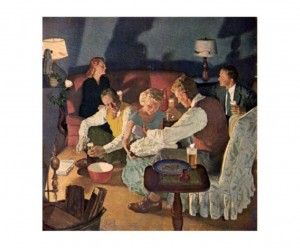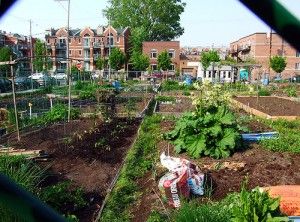Friday

BYCU
This is a nice picture. It's by the drinker's artist, Douglas Crockwell, and entitled "A Winter Evening at Home." I won't be spending this evening at my house, but instead will be frequenting a downtown bar to listen to two friends play guitar and cover Jimmy Buffett and songs of his genre (read: mellow). I won't be able to stay late, since my nephew has a home basketball game against our arch-rivals. I figure a couple of beers will blend well with a spirited basketball game and questionable referring.

Urban Stuff
I've been a fan of Mayor Dave Bing's effort to introduce agricultural operations in Detroit. I talked to some people from the Detroit area, who still get to downtown frequently, and they told me the operations are going well. Large swaths of formerly-bombed-out blocks have been reclaimed and are now growing corn, tomatoes, and other vegetables.
Now, if Michigan could take its jackboot off the necks of the alcohol industry, maybe Detroit could try another experiment: Urban Wineries. I guess they're the newest rage. It sounds like a good development for everybody:
Urban wineries are located in downtown areas, in warehouses, and industrial parks. They often have tasting rooms and retail shops attached. And, they are miles from the farms that produce the grapes. Winemakers rent space in the city, rather than the paying high prices for land in wine country. This new crop of vintners is learning that you don't need to spend millions on a plot of land, and take the risk of crop failure, to make good wine.
Grapes can be trucked in from regional vineyards, or even from around the country. The urban winery can then crush, ferment, and cellar the wine at their facility in the city. Or, the juice can be processed at a co-op close to the vineyards, and then finished in the city. Winemakers can choose grape varieties, select different appellations, and make the same production decisions for blending, bottling, and labeling as any other winery. And, the wine is just as good as wine made near the vineyards.
ӬUrban wineries benefit the wine consumer as well. Most consumers don't care where the grapes were crushed, fermented, or aged into wine. Now, connoisseurs can simply walk to a winery rather than traveling miles to the nearest vineyards. The experience in the urban winery is the same as in the tasting room of a vineyard located winery. The consumer can still experience the wine and purchase bottles directly from the source.
